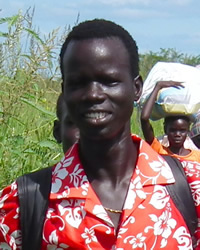Nuer in United States

Photo Source:
Combonianos Brasil - Pixabay
|
Send Joshua Project a map of this people group.
|
| People Name: | Nuer |
| Country: | United States |
| 10/40 Window: | No |
| Population: | 18,000 |
| World Population: | 1,758,000 |
| Primary Language: | Nuer |
| Primary Religion: | Ethnic Religions |
| Christian Adherents: | 30.00 % |
| Evangelicals: | 8.00 % |
| Scripture: | Complete Bible |
| Ministry Resources: | Yes |
| Jesus Film: | Yes |
| Audio Recordings: | Yes |
| People Cluster: | Nilotic |
| Affinity Bloc: | Sub-Saharan Peoples |
| Progress Level: |
|
Introduction / History
According to the Nuer elders, the Nuer originated from a big tree in a place called Liech. As their number increased there was not enough grazing field for the large number of cattle and some of them migrated. Quarrels also cause some of them to break away.
The Nuer are located in both Ethiopia and South Sudan, with a small diaspora also present in Australia and the United States.
What Are Their Lives Like?
Those who come to Australia and the United States are often war refugees. They must deal with the trauma of war.
Africans in the diaspora, especially in North America, cannot be classified as a single homogenous entity but rather as a vast network of overlapping identities shaped by religion, history, migration patterns, culture, and evolving social contexts. Regardless of their religious or cultural backgrounds, Africans in North America are deeply interconnected through various social networks and associations. They tend to maintain and pursue their religious and cultural values more actively than many other racial groups, even as different social institutions, secular norms, and racial dynamics influence their life experiences. Over time, however, some Africans, particularly those of the younger generation, may gradually assimilate into the individualistic religious lifestyle that characterizes much of North American religious belief and practice, where faith is treated as a personal choice and often takes on a different tone.
One of the strongest binding forces among Africans in North America is their shared experiences of migration, racial profiling, and cultural familiarity, such as common foods, music, and communal values. Nevertheless, due to internal racialization, linguistic heritage, cultural dynamics, and religious identity, some Africans from North Africa, particularly Muslims, may gravitate more toward Arab or Islamic communities than to broader "African" associations. Similarly, Francophone Africans often form their own social networks based on shared language, worldview, and colonial heritage. The individualistic religious environment and sense of cultural superiority that often characterize North American churches have led many African Christians, particularly in the U.S. and Canada, to establish diaspora congregations. These congregations blend African worship styles, music, dance, and language with Western church structures. They serve not only as places of worship but also as centers of social support, networking, and cultural preservation.
What Are Their Beliefs?
Nuers believe in supernatural beings. They also believe in lesser gods, which they call "kuuth," but they know that there is only one God (Kuoth). As many of the Nuer are now Christian, they could no longer believe in "kuuth," but they believe in Kuoth, which means one God. Nuer usually pray early in the morning. Some of them in Australia are strong Christians who can disciple others.
What Are Their Needs?
For many, trauma counseling is a primary need. Others need to learn English and job skills.
Prayer Points
Pray that the Lord will continue to open the eyes of the Nuer community to see their opportunity to trust Christ for an abundant and eternal life.
Pray that the Lord will raise up qualified Nuer pastors and teachers, and they will teach their congregations to reach the nations for Christ.
Pray for the Holy Spirit to bring revival to Nuer families and churches.